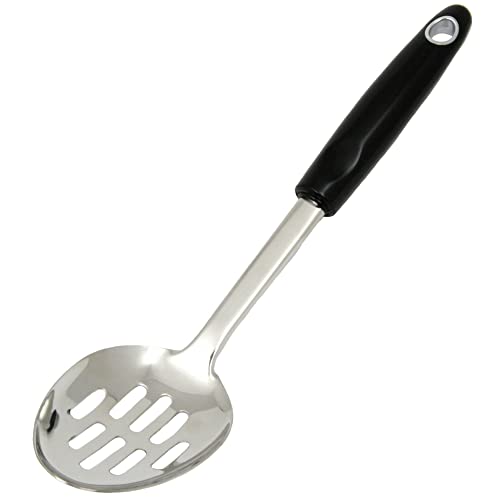Shaped like regular spoons, but have a few slots situated at the base of the spoon’s head. Unlike a soup spoon, slotten spoods have slots allow liquids to drain out from the spoon, leaving behind only solids that were scooped up in the process. If you're fond of cooking stews and soups, this is a great addition to your kitchen, but where to begin? With all the options on the market, we've crafted this comprehensive buying guide to help you make the most informed decision. Here's everything you need to know before buying a slotted spoon.
The Benefits of a Slotted Spoon
You can cook safely with them
Slotted spoons are quite useful as substitutes for regular or serving spoons in a lot of situations. Contrary to its looks, you can actually stir up food with the spoon, as while there are open slots, there’s still plenty of solid surface area to mix soups and broths with. You’ll find it especially easy to mix thick broths, too, as it’ll be more difficult for the broth to pass through the slotted spoon’s slots. Another advantage of slotted spoons that makes them safe for cooking is that you can easily remove hot water and oil from the spoon when you remove them from the pot. Some people have pretty sensitive skin, and making contact with hot oil and water is not a good idea. With a slotted spoon, all that oil and water just drains right through.
You can retrieve solids without the liquids
Slotted spoons are especially useful in making particular dishes because you can separate the solids from the liquids when you scoop up the dish. If you’re trying to examine the color and texture of your meat in a soup, for example, using a slotted spoon will make it easier to examine the food, as you won’t be distracted by all that soup. Aside from soups, you can also use slotted spoons to remove solids while leaving the liquids behind. If you’re boiling chicken, for example, you can leave behind the water to use as a stock. Or, if you don’t have any other useful utensils, you can use the slotted spoon to retrieve some fries from the oil. A spaghetti spoon is almost exactly the same in terms of function, but unlike the large-clawed spaghetti spoon, slotted spoons are almost flat and are not designed to lift large amounts of meat or food.
Things To Consider When Buying a Slotted Spoon
Size
You’ll want to worry about the size of the spoon first if you ever consider buying a slotted spoon. Slotted spoons come in all shapes and sizes: some are as small as a teaspoon, whereas others can be large enough for cooking soups. The ideal size for your kitchen is highly dependent on what meals you currently cook, as well as what meals you intend on cooking moving forward. A general rule of thumb is that you’ll probably be fine with a large-sized slotted spoon. After all, you really only take advantage of the slotted design when separating solids from liquids, and in those situations, you probably want a large spoon and not a small one. However, if you think that a smaller slotted spoon would serve you well, you can buy multiple spoons in different sizes to help prepare you for all sorts of scenarios.
Material
The material of the spoon can also vary from manufacturer to manufacturer. There are currently three popular materials used in making slotted spoons: silicone, metal, and wood. Silicone is typically used in both the head and the handle portions of the spoon. Metal is usually limited for use in the head, as the handle will almost always have a grip made out of rubber or some plastic for insulation purposes. Wood can be used in both the handle and the head of the spoon. What you ultimately choose doesn’t matter all that much, though there are a few differences that you may want to consider. For one, metal is usually the heaviest of the three materials, and wooden spoons may only allow for hand washing. Silicone spoons can also be permanently damaged if subjected to extreme heat, so be careful when cooking, especially hot foods or with oil when using silicone.
Tips For Using a Slotted Spoon
Wash them properly
Like all utensils, it’s important to wash the spoon after use. However, you’ll also need to take into consideration whether or not the spoon is safe to be washed in a dishwasher. The product packaging or store page will usually mention whether or not you can wash it in a dishwasher. If it’s hand wash only, set it aside with other hand wash-only utensils and have them washed by the sink while the dishwasher handles the rest.
Sort them accordingly
If you sort your kitchen utensils, we recommend placing the slotted spoon beside other spoons, and if possible, right next to spoons of the same size. That way, you can easily figure out where the slotted spoon is without having to scour through your drawers and shelves for it.






